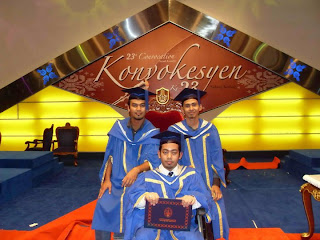
Setelah sekian lama aku tidak menulis ceritaku di dalam Bahasa Melayu, aku dapat merasakan standard bahasaku kian menurun. Selama ini bahasaku sentiasa bagus, aku sering dipuji guru-guruku mahupun semasa berada di sekolah rendah ataupun sekolah menengah kerana lenggok bahasaku yang indah. Namun, kini aku berasa kekok untuk menulis walaupun satu perenggan. Hari ini, aku berasa tersentuh dan kagum dengan dua orang guru Bahasa Melayu yang tidak hanya manis mulut di bibir tetapi hamburan kata-kata nasihat yang singgah di telingaku bagaikan serpihan permata yang berkilauan dan menusuk kalbuku, tidak mungkin akan ku lupakan. Omongan mereka bukanlah sekadar tin kosong tetapi bagaikan kilat, tegas dan penuh bermakna. Mereka tidak lain dan tidak bukan adalah dua guru yang aku anggap seperti kakakku sendiri iaitu Kak Long dan Kak Yus.
Namun coretan aku pada kali ini adalah lebih berkisar kepada diriku sendiri tetapi adikku sendiri yang amat aku kagumi. Jika aku lihat pada masa lampau, aku hanya mampu mengucapkan rasa syukur yang amat tinggi kerana dilahirkan dalam keadaan begini. Meskipun ada perkara yang masih agak sukar untuk ku terima seperti keadaan adik aku yang masih lagi lumpuh, sedangkan terasa seperti semalam baru sahaja melihat dia tersenyum tawa riang berlari-larian. Namun aku pasrah. Aku tidak dapat membayangkan sekiranya aku berada di posisi adikku. Mungkin aku sudah hilang arah tujuan untuk hidup. Untuk itu, tiada perkataan yang dapat kuguriskan untuk aku sampaikan bahawa aku sangat menghormati dan kagum dengan kekuatan adikku untuk menerima dirinya seadanya.
Masih kuat lagi di dalam kotak memoriku akan peristiwa yang telah berlaku yang membuatkan aku berasa ingin menitiskan air mata. Tatkala aku memegang kerusi roda adikku untuk mengusungnya ke kuliah di UUM, terasa beban yang amat tinggi yang aku tidak dapat gambarkan meskipun aku cuba lampirkan dalam sejuta patah perkataan sekalipun. Bak kata pepatah, berat mata memandang, berat lagi bahu yang memikul. Saat itu, aku dapat melihat disebalik tenang riak muka adikku, dia menanggung satu rasa pilu yang teramat. Dalam keadaannya yang begitu, dia terpaksa menepis rasa malu yang menebal dan rasa bersalah kerana telah membebankan orang lain. Ya, dia harus mengetepikan air mukanya untuk meminta rakan-rakannya membawanya ke kuliah yang jalannya berbukit-bukau. Di saat aku sedang mengusungnya, aku lihat riak wajahnya yang begitu ceria meskipun ada mata asing yang memandang pelik pada dirinya. Jika diriku berada pada tempatnya, aku pasti akan cuba mengelakkan daripada bertembung dengan pelajar-pelajar lain sebanyak yang mungkin. Mulai saat itu, aku berjanji kepada diriku supaya akan sentiasa cuba untuk berada di sisinya supaya dapat menghantarnya ke kuliah agar dia tidak merasa beban kerana membebankan orang lain dan supaya aku dapat membuatkan dirinya tidak berasa keseorangan di situ.
Air mataku pasti bergenang bila aku teringatkan saat dia berada pada semester yang ke-2. Dengan hanya satu laluan yang tidak mempunyai "ram", adikku terpaksa menengsotkan dirinya untuk turun daripada tangga satu persatu untuk ke kuliah. Aku alihkan pandanganku ke arah lain, cuba untuk tidak menunjukkan betapa pedihnya hatiku melihat keadaannya begitu. Agak menyedihkan bila memerhatikan pelajar-pelajar lelaki lain hanya memerhatikannya sahaja. Dalam hatiku, "Ya Allah, haruskah adikku melalui saat-saat ini setiap hari untuk menghadiri kuliahnya?" Alhamdulilllah, jalan baru dengan "ram" telah dibuka dan adik aku tidak payah lagi untuk menuruni anak-anak tangga untuk ke kuliah.
Hati aku cukup terguris tatkala aku melawatnya di hostelnya yang ketika itu dia hanya melapik perutnya dengan mi "maggi". Betapa dia tidak mahu menyusahkan sesiapa meskipun kakaknya sendiri sehingga dia lebih rela berlaparan. Meskipun tidak dinyatakan pada diriku namun aku tahu waktu itu tiada siapa yang dapat membawanya ke cafeteria untuk membeli makanan tengah hari. Aku salahkan diriku kerana tidak betul-betul menjaga adikku. Lantas aku segera ke cafeteria dan membungkus makanan untuk adikku.
Sehingga saat ini aku enggan untuk pergi melancong ke tempat yang lebih jauh kerana tatkala aku ingin menikmati waktu senangku pasti aku akan teringat akan diri adikku yang hanya mampu berada di rumah dan dengan dunia sibernya. Daripada pancaran matanya aku tahu dia ingin merantau lebih jauh, melihat tempat-tempat yang tidak pernah dilihatnya. Dalam hatiku tahu dia juga ingin menjadi seperti orang lain, mampu merasa makanan enak di restauran yang mewah, ingin bergerak bebas.
Hatiku runtun tatkala adikku mengatakan, "macam mana nak cari kerja, semua tawaran kerja tu hanya untuk orang biasa." Tatkala itu, adikku baru sahaja tamat pengajian ijazahnya. Di tangannya ada borang pemohonan bekerja. Meskipun Ijazah Sajana Muda IT yang diambil namun kesemua tawaran bekerja tidak ada kaitan langsung dengan kursus yang diambilnya. Bahkan, hampir kesemuanya memerlukan pekerja yang sihat tubuh badannya seperti pegawai kastam.
Ya Allah, tabahkanlah hatiku untuk menghadapi masa-masa depan dengan adikku. Dalam hatiku sentiasa terbayang masa nanti di mana kedua-dua orang tuaku tiada siapa lagi yang dapat menjaga adikku.
Maafkan diriku sekiranya sampaianku tidak begitu terang dan bahasaku begitu teruk sekali kerana hanya ini sahaja mampu aku nyatakan dalam bahasa ibundaku sendiri.
Rasa terima kasih juga aku lampirkan buat Ju, Yusri, Mustaqim, Iqbal dan rakan-rakan adikku, Ihsan yang lain yang setia menolong adikku tanpa mengharapkan apa-apa balasan sekalipun. Moga Allah sentiasa memberkati hidup sekalian. Jasa kalian akan sentiasa terpahat di hati.